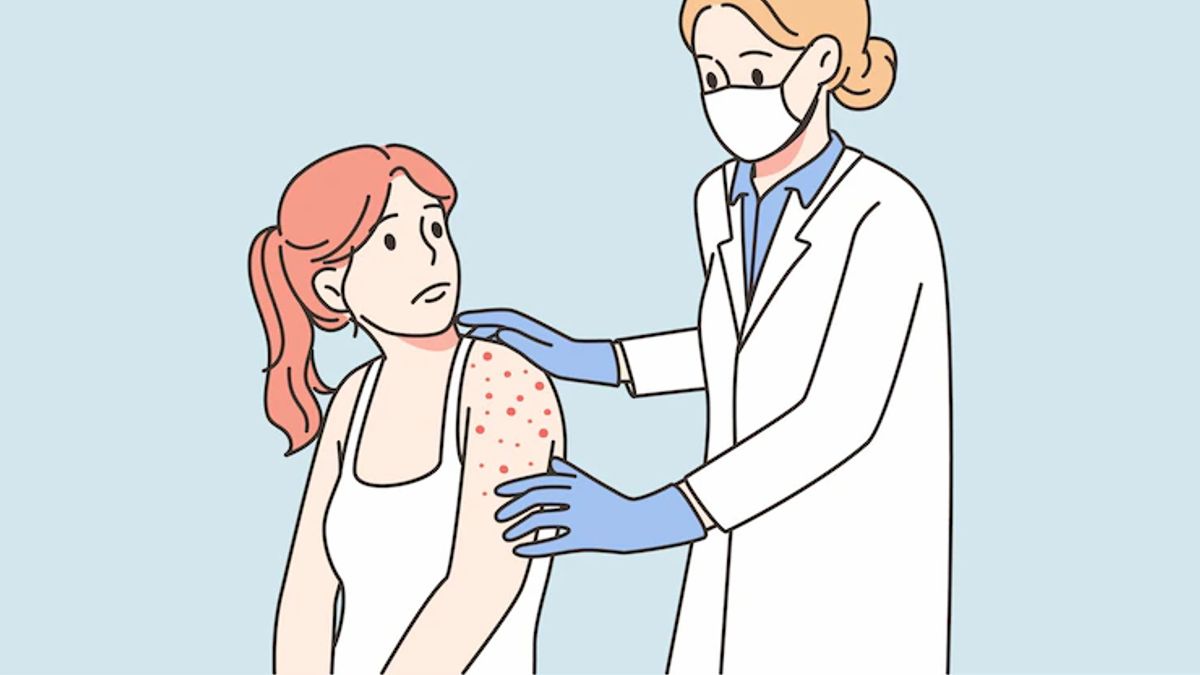YOGYAKARTA - You may have felt a rash or breca break at some point, either from toxins from plants, insects or chickenpox or something annoying and painful isn't it? Why is your skin such red spots? More importantly, is there anything you can do to deal with itching red spots spreading?
We often consider the skin as a barrier, the skin keeps our body in, and prevents the outside world from leaving. But our skin is also filled with special cells from the immune system. These cells protect the skin and body from viruses, bacteria, and other threats. Whenever these cells detect suspicious substances, they start a chain reaction in the skin that causes inflammation. The medical name for this reaction is dermatitis. But it's better known as a rash.
There are many types of dermatitis, and each has a different treatment. Sometimes skin immune cells react to something that comes directly into contact with the skin. At other times, the immune system is lit up in the skin due to infection or disease all over the body.
Symptoms of these various types of rashes often overlap. "Gatal is a common symptom for all these problems," said Dr. Stephen I. Katz, director of the National Institute of Arthritis and Muskuloskeletal and Skin of NIH. Many rashes are red, painful, and irritated. Some types of rashes can also cause limpness or crude skin patches. While most rashes are cured fast enough, others last a long time and need to be treated for a long time.
The eczema, or atopic dermatitis, are dry, red, and itchy rashes that attack 1 in 5 babies and small children. These often improve over time, although they can survive to adulthood or start at a later date. Under these conditions, the waterproof barrier between skin cells becomes weak, allowing moisture to come out and other things in. That's why atopic dermatitis sufferers have to moisturize their skins, and they are more susceptible to skin infection.
The researchers recently identified specific genes involved in maintaining skin barriers. People with certain versions of this gene are more likely to be exposed to atopic dermatitis.
The outer guard is against bacteria and dangerous agents," Katz said. "If the barrier is broken somehow, you can become more allergic to something."
Skin Allergy
The allergy of the skin, or dermatitis of an allergic contact, produces a red and itchy rash that is sometimes accompanied by a drop or a small bump. Ruam appears when the skin comes in contact with an allergen, a substance that is usually harmless that attacks the immune system. Alergen triggers allergic reactions. Alergen can come from soap, cream, and even certain pets.
Your immune system may not react when you first find allergen. But over time, your immune system can become sensitive to the substance. As a result, your next contact can cause inflammation and an allergic rash.
The most common dermatitis form that can be seen anywhere is dermatitis of allergic contact to nickel, Katz said. "Why? Because of the ear piercings. Many cheap earrings made of nickel, and over time, wearing nickel earrings can cause allergic reactions to the metal.
Another common cause of allergic dermatitis is plant and insect poisons. These plant stems and leaves produce chemicals that are most likely to cause allergies. If you touch one of them, wash your skin as soon as possible. Chemicals can also last a long time in clothing, so it's important to wash any clothes or shoes or even pets that come into contact with this plant.
Light cases of dermatitis of allergic contact usually disappear after a few days or weeks. But if the rash continues, it is very uncomfortable or appears on the face, it is important to meet a doctor. A doctor can prescribing a drug that will lower immune reactions in the skin. This relieves swelling and itching and will protect your eyes and face.
Skin immune cells can also produce rashes when reacting to germs such as bacteria, fungi, and viruses. Infections in bacteria and viruses in your body can also cause your skin to acne. The chickenpox virus, for example, can cause itching spots in the child. Years later, in older adults, the same virus can reappear as a herpes zoster, causing a painful rash and high fever. Vaccines can prevent some rash-causing diseases, including chickenpox, herpes zoster, and▁antaranya.
Certain drugs, including antibiotics such as amoxylin, can also cause an itching skin rash. If you are allergic to a drug, rash can be the first sign of a serious reaction. Like other allergies, reactions to a drug may not occur the first time you drink them. It can appear after some use. However, not all drug rashes are caused by allergies. If you are acne in an itching place after starting a new prescription drug, immediately contact your doctor.
Although most rashes improve over time, some can last a lifetime. Psoriasis, a condition in which skin cells accumulate into thick red spots, tends to be passed down in the family. This is a complex genetic disease, as not only one gene causes psoriasis, but a lot, Katz says. Although none of these genes alone have a major effect on disease, knowing which genes involved can help researchers design potential new treatments. Other long-term diseases that can cause rashes include autoimmune diseases, such as lupus, and some types of cancer.
What Should Be DONE?
If you see an itching rash or pain on your skin, think twice before going to a drug store and buying a cream if you don't know the cause. Krim you buy can cause problems that make your initial problems worse," Katz said. Because rashes can be caused by various things bacterial, viral, medicines, allergies, genetic abnormalities, and even light important to know the type of dermatitis you are suffering from.
"If you have a significant rash, you have to see a dermatologist," Katz said. A dermatologist, or dermatologist, is specially trained to find out the cause of the rash and helps you get the right treatment.
Your skin is your protection. It's not just the cover that keeps your body in; it's also your first defensive line against germs and chemicals. Your skin care so that your skin can touch you.
So after knowing that itching red spots are spreading, watch other interesting news on VOI, it's time to revolutionize news!
The English, Chinese, Japanese, Arabic, and French versions are automatically generated by the AI. So there may still be inaccuracies in translating, please always see Indonesian as our main language. (system supported by DigitalSiber.id)








